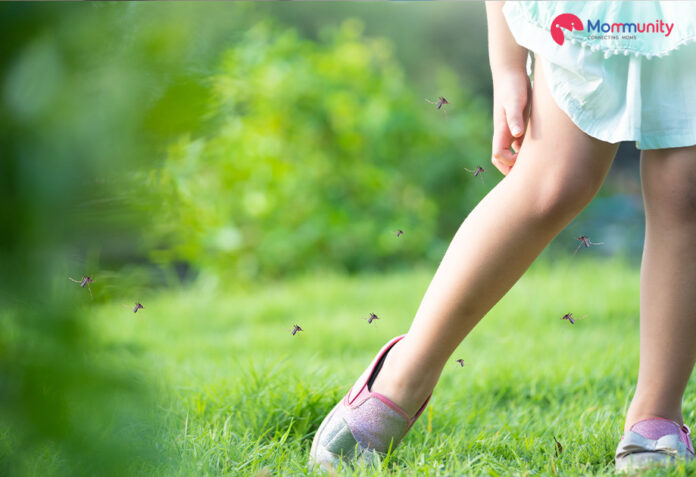Are you irritated with buzzing all around? These little devil sucks blood like they are in a party. The after-effect of the party is Dengue. Dengue fever, a mosquito-borne illness, is a growing worldwide concern, especially in tropical and subtropical regions. It’s too dangerous for babies.
Recognizing dengue symptoms in babies is crucial for timely medical precautions. You can prevent your baby from getting dengue by understanding the symptoms, making a diagnosis, and preventing it. In the blog, you will learn every aspect of dengue.
5 Early Symptoms of Dengue in Babies
Babies with dengue may show symptoms similar to other common viral infections. Early detection can be challenging, but being aware of the following signs can make a difference:
1. High Fever
One of the first signs is a sudden start of high fever, often reaching up to 104°F (40°C).
2. Rash
A rash may appear on the baby’s skin, starting on the trunk and spreading to the limbs and face.
3. Loss of Appetite
Babies may refuse to eat or drink, showing a noticeable decrease in appetite.
4. Irritability and Fussiness
Increased irritability and fussiness are common due to discomfort and fever.
5. Cold-like Symptoms
A runny nose, mild cough, and sneezing can be present, making it easy to mistake dengue for a common cold.
Severe Symptoms of Dengue in Babies
Sometimes, dengue can progress to severe dengue, which is more serious and requires immediate medical cure. Let’s have a look out for these severe symptoms:
-
Persistent Vomiting
Frequent vomiting, which can lead to dehydration.
-
Severe Abdominal Pain
Intense pain in the abdomen, often accompanied by tenderness.
-
Bleeding
Signs of bleeding can include nosebleeds, bleeding gums, or bruising easily.
-
Lethargy
Extreme tiredness and lethargy, with the baby appearing unusually weak.
-
Difficulty Breathing
Labored or rapid breathing can indicate fluid accumulation in the lungs.
Diagnosis of Dengue in Babies
If you suspect your baby has dengue, consult a doctor immediately. The diagnosis typically involves:
-
Medical History and Physical Examination
The doctor will review the baby’s symptoms and medical history and conduct a physical examination.
-
Blood Tests
Blood tests are necessary to confirm dengue. These tests check for the presence of the dengue virus or antibodies produced in response to the infection.
Treatment of Dengue in Babies
There is no specific antiviral treatment for dengue, but supportive care is crucial. Key aspects of treatment include:
-
Hydration
Making sure the baby stays hydrated is vital. Offer plenty of fluids, including oral rehydration solutions.
-
Fever Management
Use age-appropriate fever reducers like acetaminophen (paracetamol) to manage high fever. Avoid aspirin and ibuprofen, as they can increase the risk of bleeding.
-
Rest
Ensure the baby gets plenty of rest to support the immune system.
Prevention of Dengue in Babies
Preventing mosquito bites is the most effective way to protect your baby from dengue. Here are some preventive measures:
-
Use Mosquito Nets
Cover the baby’s sleeping area with mosquito nets, especially during peak mosquito activity times (dawn and dusk).
-
Protective Clothing
Make sure your baby is dressed in clothing covering as much skin as possible. Opt for long-sleeved shirts and long pants to reduce the amount of exposed skin. This kind of clothing acts as a barrier, making it more difficult for mosquitoes to bite your baby and reducing the likelihood of contracting dengue.
-
Insect Repellents
To protect your baby from mosquito bites, apply insect repellent that is specifically formulated for infants to any exposed areas of their skin. Additionally, you can apply the repellent to their clothing for extra protection. It’s important to choose a product that is safe for your baby, so be sure to consult with your healthcare provider to get recommendations on the best and most suitable insect repellents for your little one.
-
Eliminate Breeding Sites
Remove standing water around your home where mosquitoes can breed. Regularly clean and empty containers like flower pots, buckets, and birdbaths.
-
Window and Door Screens
To prevent mosquitoes from entering your home, it is essential to install screens on all windows and doors. These screens act as a physical barrier, effectively keeping mosquitoes and other insects out while still allowing fresh air to circulate throughout your home. Make sure the screens are properly fitted and free from any tears or holes, as even small openings can allow mosquitoes to enter.
Key Takeaway
Recognizing the early and severe dengue symptoms in babies is necessary for timely medical intervention and reducing the risk of complications. Babies may show a range of dengue symptoms, from high fever and rash to severe abdominal pain and difficulty breathing. Immediately. Consultation with a doctor and appropriate treatment can greatly improve outcomes.
Preventive measures play a crucial role in protecting your baby from dengue. Using mosquito nets, dressing your baby in protective clothing, applying baby-safe insect repellents, and installing screens on windows and doors are effective strategies. Eliminating mosquito breeding sites around your home is also vital in reducing the risk of mosquito bites.
By understanding the dengue symptoms, diagnosis, and prevention methods, you can help safeguard your baby’s health. Stay vigilant and informed about dengue symptoms, and take proactive steps to prevent this mosquito-borne illness.




